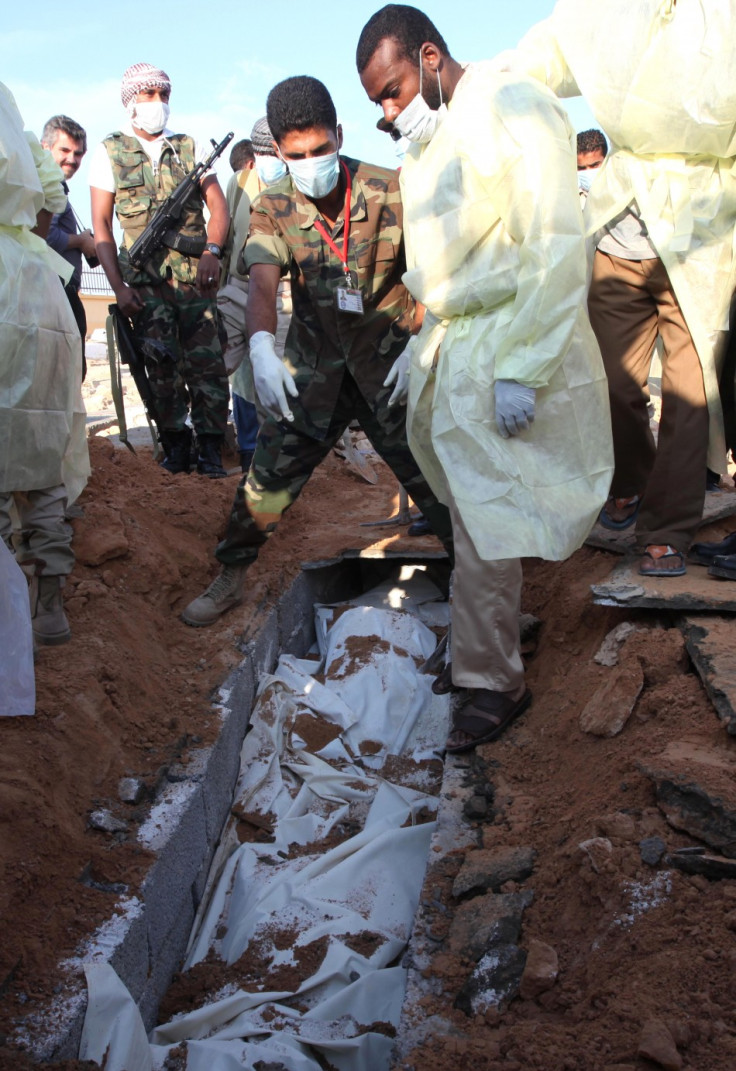Hundreds of Gaddafi Supporters Killed in New 'War Crime'

More atrocities conducted during the Libyan conflict have emerged as the bodies of 267 people, thought to have been executed, have been discovered in Sirte, a local Libyan newspaper reported.
Most of those found dead were supporters of Gaddafi, a Red Cross source told the online Libyan newspaper Qurynanew.
The majority of the bodies appear to have been executed and were subsequently buried in mass graves in Sirte, the birthplace of Gaddafi, and the surrounding area, the source said.
The newspaper also said that officials from Benghazi and Sirte numbered and photographed the bodies before burying them.
They have also set up an archive to store the information they have gathered, aimed at the families of the victims.
The Transitional National Council (TNC) pledged to investigate the deaths and punish the perpetrators.
The new macabre discovery comes as Human Right Watch (HRW) also uncovered 53 decaying bodies, thought to be those of Gaddafi loyalists, abandoned in a hotel in Sirte.
A further 95 bodies at the site where Gaddafi was captured, were alsao listed by HRW. It said that most of them had been killed in fighting or as a result of NATO airstrikes, it also said that up to ten bodies appeared to have been executed.
Another ten bodies were also found in a separate site, still in Sirte, but they were in such bad conditions that it was not possible to identify the victims.
According to medical officials in Sirte, the bodies of 23 anti-Gaddafi fighters were also identified between October 15 and 20.
The uprising against Gaddafi started as a result of the regime's brutal actions against the population which fully came to light during the conflict after a series of mass graves and mass executions by the dictator's regime were discovered. TGaddafi's forces were also accused of using children as human shields to deter NATO attacks.
In September a mass grave containing the remains of 1,200 bodies were discovered near the infamous Abu Salim prison in the Libyan capital Tripoli. According to former inmates' accounts, the Gaddafi forces spent three hours shooting prisoner.
However throughout the conflict new allegations saw the rebels accused of atrocities, with many international organisations concluding that during the conflict, both sides had committed war crimes.
Amnesty international noted that while the Gaddafi forces committed serious violations of international humanitarian law (IHL), including war crimes, and gross human rights violations, which point to the commission of crimes against humanity . . . Members and supporters of the opposition, loosely structured under the leadership of the National Transitional Council (NTC), based throughout the conflict in Benghazi, have also committed human rights abuses, in some cases amounting to war crimes, albeit on a smaller scale."
In a report it said that members and supporters of the Libyan opposition had "unlawfully killed" more than a dozen Gaddafi loyalists between April and July, and noted that angry groups of rebel supporters "shot, hanged and otherwise killed through lynching" dozens of captured soldiers and suspected mercenaries."
Rebels were also blamed for illegally imprisoning and mistreating sub-Saharan workers with Nicolas Berger, director of the Amnesty International Europe, said were "being taken from their work or their homes or the street to be tortured or killed."
The new allegations point to an increase of violence towards the end of the conflict, and the Libyan rebel are now suspected of having committed group executions, the signature-tactic of the regime they fought so hard to overthrow.
NTC leaders are now under increasing International pressure to lead an in-depth investigation of the crimes committed during the crimes by both sides, but it will be difficult for them to bring their own supporters to court without risking a massive public backlash in Libya.
On the other hand, failure to prosecute would mean that despite the fall and death of the Colonel, violations of basic human rights, illegal killings, torture and group executions are still covered up and left unpunished.
© Copyright IBTimes 2024. All rights reserved.






